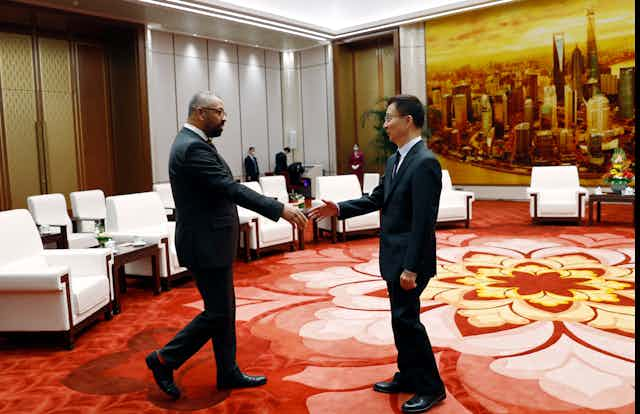The arrest of a parliamentary researcher on suspicion of spying for China has fuelled calls in Westminster for tougher action against China by the UK government. This could impact the UK economy since China is an important trading partner and industry investor.
Chinese officials and the researcher have both denied the spying claims. But prime minister Rishi Sunak reportedly ticked off his Chinese counterpart, premier Li Qiang, on the sidelines of the G20 in New Delhi last weekend, accusing China of undermining parliamentary democracy.
Deputy prime minister Oliver Dowden has also said there is a “strong case” for the government to officially designate China as a threat to the UK, but that it was unrealistic to “completely disengage”.
This is an early Christmas present for the hawkish side of the Conservative party which has called for the UK to take a tougher stance on China for several years. A more critical engagement with China is long overdue, but clumsy mitigation policies won’t safeguard the UK’s relationship with China – economic or otherwise.
Leaving aside the political theatrics, little is known yet of the nature of the charges of the two persons arrested in March under the Official Secrets Act over alleged espionage-related offences. One of these people was a parliamentary researcher whose alleged identity was recently published in the media. But China is unlikely to ignore such a slight.
So what could this mean for British firms and the UK economy? A look at trade, investment and broader UK cooperation with China gives a sense of the economic hit the UK might sustain from any action against China.
What does the UK import from China?
China is the UK’s fourth largest trading partner, accounting for 6.1% of total UK trade in goods and services, which was £107.6 billion over the 12 months to the end of March 2023. Of this, the UK exported £38 billion of goods and services to China, but imported £69.5 billion from China.
In other words, the UK imports substantially more from China, meaning it has an overall trade deficit with the Asian country.
This deficit, however, is concentrated in goods rather than services. China is the UK’s second largest source of physical product imports, accounting for 10.4%. But as a destination for exports, it is the UK’s fifth largest export market, taking 6.6% of British goods.
Major UK imports from China include telecoms and sound equipment, office machinery, clothing and cars. The leading UK exports to China include cars, crude oil, pharmaceuticals and scientific instruments. The largest category, unspecified goods (41%), could include products like Scottish salmon, whiskey and luxury clothing from British brands like Burberry.
How could China squeeze the UK economy?
Services are a bright spot for UK exports to China. At £9.9 billion, the UK latest annual services exports are three times the value of those China sells to the UK. Especially important are financial services and educational services. More than 150,000 Chinese students are studying in the UK right now.
These students directly and indirectly support local economies. Universities and their host towns, cities or areas are typically heavily reliant on student spending in general, not just those from China and other countries.
The recent spying allegations could encourage Chinese government retaliation against the UK comparable to action it has taken against Australia in recent years. This included restricting imports, which would hurt and widen the merchandise deficit. Australia toughed it out, and China softly wound back its restrictions over the past year.
But UK industries aren’t as heavily dependent on Chinese demand as some of those in Australia such as coal mining, barley and wine production. Also, exports of UK services could be less affected by government action because Chinese people’s demand for things like education is so strong government action may not dull this demand.
It’s more difficult to predict the impact of potential government action on foreign direct investment (FDI). This is when companies invest in other countries, often encouraged by subsidies or tax breaks.
The total stock of FDI into the UK in 2021 was £2 trillion, of which a third comes from the US, while China accounts for just 0.3%. But how much investment comes into the UK from China via tax havens and third countries is a big unknown. Total Chinese money invested in firms, real estate and other ventures in the UK could well exceed official accounting.
Brexit has already been a major disincentive for Chinese state and private investors. The electric vehicle maker BYD, now the world’s largest producer, shied away from the UK for that very reason.
If the UK is seen as an increasingly hostile environment for China, it won’t help encourage Chinese FDI. For the more hawkish on China that might seem like a good thing. But this is short sighted. Decoupling from China is neither feasible nor desirable.

Managing the UK’s relationship with China
UK foreign secretary James Cleverly subtly captured the problem when he said before a recent visit to China that the challenge was to “manage our relationship with China across a range of issues”, citing climate change, pandemic prevention, economic instability and nuclear proliferation. “China’s size, history, and global significance means they cannot be ignored,” he said, adding that China had to fulfil its international commitments and obligations.
There are very real risks to UK security from China. But addressing this will require a deft hand by policymakers. Continued engagement is needed with China if the UK is to tap into the technological advances it has made in green technologies and other sectors vital to an advanced economy.
China needs to be kept inside the tent. Left outside, it will become so much more difficult to observe, let alone to share in economic developments that might be beneficial for the west. Sensible risk mitigation and collaboration strategies will be much more fruitful for the UK economy than name calling.

